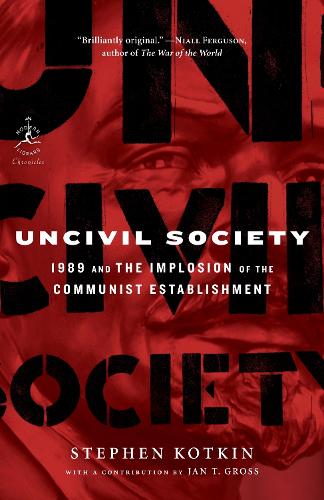
Uncivil Society: 1989 and the Implosion of the Communist Establishment
(Paperback)
Publishing Details
Uncivil Society: 1989 and the Implosion of the Communist Establishment
By (Author) Stephen Kotkin
Contributions by Jan Gross
32
Random House USA Inc
Modern Library Inc
15th November 2010
United States
Classifications
General
Non Fiction
947.0009048
Physical Properties
Paperback
256
Width 132mm, Height 203mm, Spine 15mm
232g
Description
Twenty years ago, the Berlin Wall fell. In one of modern history's most miraculous occurrences, communism imploded-and not with a bang, but with a whimper. Now two of the foremost scholars of East European and Soviet affairs, Stephen Kotkin and Jan T. Gross, drawing upon two decades of reflection, revisit this crash. In a crisp, concise, unsentimental narrative, they employ three case studies-East Germany, Romania, and Poland-to illuminate what led Communist regimes to surrender, or to be swept away in political bank runs. This is less a story of dissidents, so-called civil society, than of the bankruptcy of a ruling class-communism's establishment, or "uncivil society." The Communists borrowed from the West like drunken sailors to buy mass consumer goods, then were unable to pay back the hard-currency debts and so borrowed even more. In Eastern Europe, communism came to resemble a Ponzi scheme, one whose implosion carries enduring lessons. From East Germany's pseudotechnocracy to Romania's megalomaniacal dystopia, from Communist Poland's cult of Mary to the Kremlin's surprise restraint, Kotkin and Gross pull back the curtain on the fraud and decadence that cashiered the would-be alternative to the market and democracy, an outcome that opened up to a deeper global integration that has proved destabilizing.
Reviews
"Following hard on the heels of Armageddon Averted, Stephen Kotkin has written a brilliantly original account of the fall of the Soviet empire. Almost everything on this subject up until now has been journalism. Kotkin's genius as an historian is to turn conventional wisdom on its head and force us to rethink completely a revolution we thought we understood merely because we lived through it." Niall Ferguson, Laurence A. Tisch Professor of History at Harvard and author of The War of the World
"In this lively and fast-paced study, two distinguished Princeton historians, Stephen Kotkin and Jan Gross, analyze the 1989 revolution in Eastern Europe as a product of the political bankruptcy of 'uncivil society,' meaning the communist elite. Using the case studies of Poland, Romania, and the German Democratic Republic, the authors combine deep historical analysis of the development and failures of East European communism with brilliant insights into the events of 1989 themselves. The book makes a critical contribution to our understanding of the annus mirabilis." Norman M. Naimark, Robert and Florence McDonnell Chair of East European History at Stanford University
Author Bio
Stephen Kotkin is Rosengarten Professor of Modern and Contemporary History at Princeton University, with a joint appointment as Professor of International Affairs in the Woodrow Wilson School. He is the author of the enormously influential books Magnetic Mountain-Stalinism as a Civilization and Armageddon Averted- The Soviet Collapse 1970-2000 and contributes regularly to The New York Times, The New Republic, and the BBC. Jan T. Gross a native of Poland, also teaches at Princeton, where he is the Norman B. Tomlinson '16 and '48 Professor of War and Society. He was a 2001 National Book Award nominee for his widely acclaimed Neighbors- The Destruction of the Jewish Community in Jedwabne, Poland. His most recent book, Fear-Anti-Semitism in Poland after Auschwitz, was named one of the best books of the year by The Washington Post.
